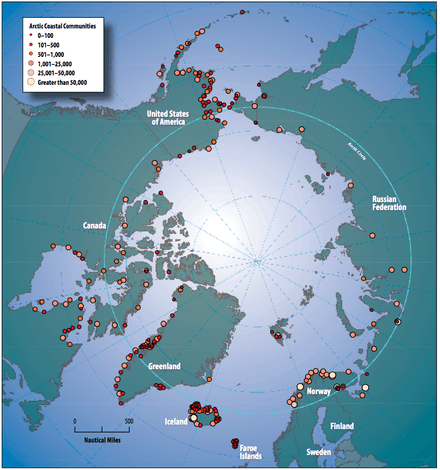Circumpolar peoples
Circumpolar peoples and Arctic peoples are umbrella terms for the various Indigenous peoples of the Arctic.

Prehistory
The earliest inhabitants of North America's central and eastern Arctic are referred to as the Arctic small tool tradition (AST) and existed c. 2500 BC. AST consisted of several Paleo-Eskimo cultures, including the Independence cultures and Pre-Dorset culture.[1][2] The Dorset culture (Inuktitut: Tuniit or Tunit) refers to the next inhabitants of central and eastern Arctic. The Dorset culture evolved because of technological and economic changes during the period of 1050–550 BC. With the exception of the Quebec/Labrador peninsula, the Dorset culture vanished around 1500 AD.[3]
Dorset/Thule culture transition dates around the 9th–10th centuries. Scientists theorize that there may have been cross-contact of the two cultures with sharing of technology, such as fashioning harpoon heads, or the Thule may have found Dorset remnants and adapted their ways with the predecessor culture.[4] Others believe the Thule displaced the Dorset.
Historical and contemporary peoples
By 1300, the Inuit, present-day Arctic inhabitants and descendants of Thule culture, had settled in west Greenland, and moved into east Greenland over the following century. Over time, the Inuit have migrated throughout the Arctic regions of Canada, Greenland, Russia and the United States.[5]
Other Circumpolar North indigenous peoples include the Chukchi, Evenks, Inupiat, Khanty, Koryaks, Nenets, Sami, Yukaghir, and Yupik, who still refer to themselves as Eskimo which means "snowshoe netters", not "raw meat eaters" as it is sometimes mistakenly translated.[6]
List of peoples by ethnolinguistic grouping
- Ancient Beringian - Siberia and Alaska
- Chukotko-Kamchatkan
- Chukchi, Siberia (Chukotka Autonomous Okrug), Russia
- Koryaks, Siberia (Kamchatka Krai), Russia
- Tungusic
- Evenks, China (Inner Mongolia and Heilongjiang), Mongolia, Russia
- Evens, Siberia (Magadan Oblast, Kamchatka Krai and Sakha), Russia
- Turkic
- Northeast Turkic
- Dolgans, Siberia (Krasnoyarsk Krai), Russia
- Yakuts, Siberia (Sakha), Russia
- Northeast Turkic
- Eskimo-Aleut
- Eskimo
- Yupik: Alaska and the Russian Far East (Chukotka Autonomous Okrug)
- Alutiiq, Alaska
- Central Alaskan Yup'ik, Alaska
- Cup'ik, Alaska
- Cup'ig, Nunivak Island (Alaska)
- Siberian Yupik, Siberia (Chukotka Autonomous Okrug), Russia
- Inuit: Greenland, Northern Canada (Nunavut, Nunavik, Nunatsiavut, Northwest Territories (Inuvik Region) and Yukon), Alaska, United States
- Kalaallit, Greenland
- Iñupiat: Northwest Arctic and North Slope boroughs and the Bering Straits, Alaska, United States
- Yupik: Alaska and the Russian Far East (Chukotka Autonomous Okrug)
- Aleut: Aleutian Islands, Alaska, United States and Kamchatka Krai, Russia
- Eskimo
- Uralic
- Finno-Ugric
- Permian
- Komi, Russia (Komi Republic and Perm Krai)
- Udmurt, Russia
- Sami: Northern Norway, Sweden, Finland, Russia (Murmansk Oblast)
- Balto-Finnic
- Permian
- Samoyedic
- Nenets, Russia
- Enets, Siberia (Krasnoyarsk Krai), Russia
- Nganasan, Siberia (Krasnoyarsk Krai), Russia
- Selkup, Siberia, Russia
- Finno-Ugric
- Yukaghirs, East Siberia, Russia
- Indo-European
- Germanic
- North Germanic
- Icelanders, Iceland
- Norwegians, Norway
- North Germanic
- Slavic
- Germanic
See also
References
- Hoffecker, John F. (2005). A prehistory of the north: human settlement of the higher latitudes. Rutgers University Press. p. 130. ISBN 0-8135-3469-0.
- Gibbon, pp. 28–31
- Gibbon, pp. 216–217
- Gibbon, p. 218
- "First Nations Culture Areas Index". the Canadian Museum of Civilization.
- "Arctic Peoples". British Museum.
Bibliography
- Takashi Irimoto, Takako Yamada (eds.) Circumpolar Religion and Ecology: An Anthropology of the North, University of Tokyo Press, 1994, ISBN 9780860085157.
